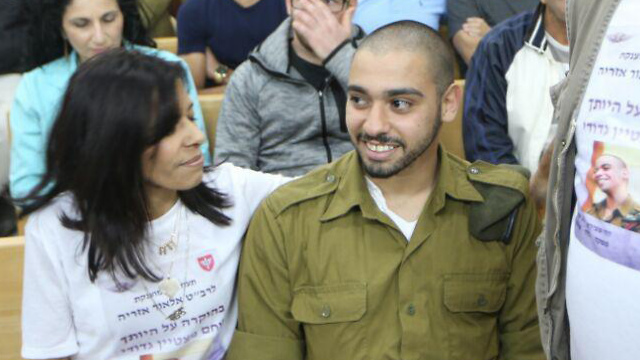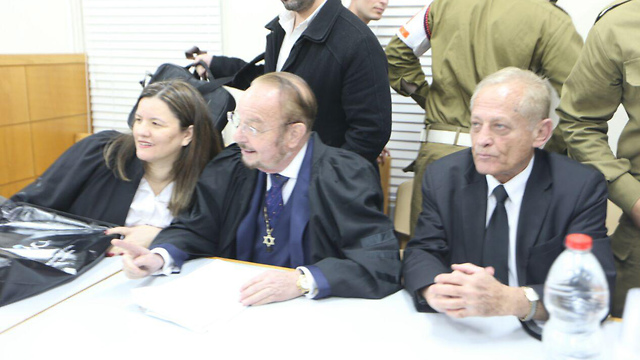
Azaria seeks early release: 'I shot a murderous terrorist, release me today'
Lawyer of the soldier convicted of manslaughter after shooting dead a seriously wounded terrorist argues Azaria's 'impeccable behavior' in prison, the fact he is favored by prison authorities, and the fact the IDF chief mitigated his sentence, should serve as reasons to grant him early release.
The military court at the Kirya IDF headquarters discussed Wednesday morning a request by former soldier Elor Azaria for early release. A decision will be made in the coming days.
Azaria, who was convicted of manslaughter after shooting dead a seriously wounded Palestinian in Hebron, has served seven months of his 14-month sentence. "I shot a murderous terrorist, release me today," he told the court.
The Military Advocate General's Office opposes cutting Azaria's sentence by half, but its representatives said they will not oppose to cutting it by a third, which means he would be released on May 10.
"The sooner this affair ends, the better it will be for everyone," said Yoram Sheftel, Azaria's attorney. "Azaria has been in a constant and ceaseless nightmare for two years."
Azaria, he said, "has behaved impeccably throughout his imprisonment. After a month, he was already included in the vacations rotation and got a 96-hour furlough for Rosh HaShana. Since then, he has gone on furlough every month. This is considered unusual and it is because of his impeccable behavior and the fact the prison authorities have done everything they could within the restrictions of the law to make it easier on him, because they too believe he doesn't belong there. With this, they reflect the great majority of the people of Zion."
"Azaria believes he has been seriously wronged, and the video he released before entering prison was watched by two million people. Only the prime minister has more views. And even then, (Azaria) nobly called on the youth to enlist in the army," Sheftel went on to say.
According to Sheftel, "even the IDF chief believes the punishment was too grave. We've never seen a situation in which, while the verdict was being read out, a statement by the IDF chief was released in which he called on Azaria to ask for a mitigation of his punishment with a hint thick as an elephant's skin that the request will be accepted—and so it was. Eventually, the IDF chief did mitigate 22 percent of the punishment. There has never been a case in which the parole board rejected a request for an early release from a soldier whose punishment was mitigated by the IDF chief."
Azaria addressed the court himself as well, repeating the same claims he made during his trial. "I shot a murderous terrorist because in the field, in real time, I was sure he had a bomb on him and felt in immediate danger. If I had known otherwise in the field, in real time, I would've acted differently," he said.
"I contributed a lot to the state's security in my army service, from the long and exhausting training to the arrests and many operations, in bad conditions and difficult situations that you encounter when walking inside a village and the fear is climbing up your body. You could be dead at any second," Azaria continued.
He noted that "I was wounded in my service from a block thrown at me, and I continued serving and contributing. I was in difficult situations that are far from the air-conditioned rooms. I ask you, return me home and let me mend the fractures. There's a bleeding wound in my family and in the entire people of Israel that must be allowed to heal. Release me today. I'm asking you."
The prosecutor, Col. Sharon Zagagi-Pinhas, argued that "cutting the punishment by half is done only in unusual circumstances to create congruence with the civilian equivalent, according to which a prisoner turns to the parole board after serving two-thirds of his punishment. In the great majority of case, cutting a sentence by half has so far only been done for medical reasons."
"Our position is to leave the matter of Azaria's early release to the consideration of the parole board after he serves two-thirds of his sentence," she added.
"In this case, there are no considerations to cutting the punishment by half, but there are to rejecting the current request," Col. Zagagi-Pinhas argued.
"Azaria was convicted of a serious offense of manslaughter. The offense was carried out with intention and not out of negligence or mistake, according to the determination of the court. Throughout the proceedings, the prisoner has not taken responsibility for his actions, nor did he express regret. We haven't heard that today either; and this morning we even heard a certain degree of rejection of the appeal court's ruling. The court determined Azaria's actions could damage the strength of the IDF."
IDF Chief of Staff Gadi Eisenkot reduced Azaria's sentence by four months in September. “Your conduct was unacceptable and was contrary to the army's command and values of the IDF,” Eisenkot wrote at the time, qualifying the sympathy behind his decision.
The IDF chief further rebuked Azaria for “the fact that you didn’t take responsibility for your actions and that you never expressed regret.”
Last November, President Reuven Rivlin rejected Azaria's pardon request. At the time, Rivlin noted that "taking all considerations into account ... an additional lightening of your sentence would harm the resilience to the Israel Defense Forces and the State of Israel. The values of the Israel Defense Forces, and among them the Purity of Arms, are the core foundation of the strength of the Israel Defense Forces, and have always stood strong for us in the just struggle for our right to a safe, national home, and in the building a robust society."












